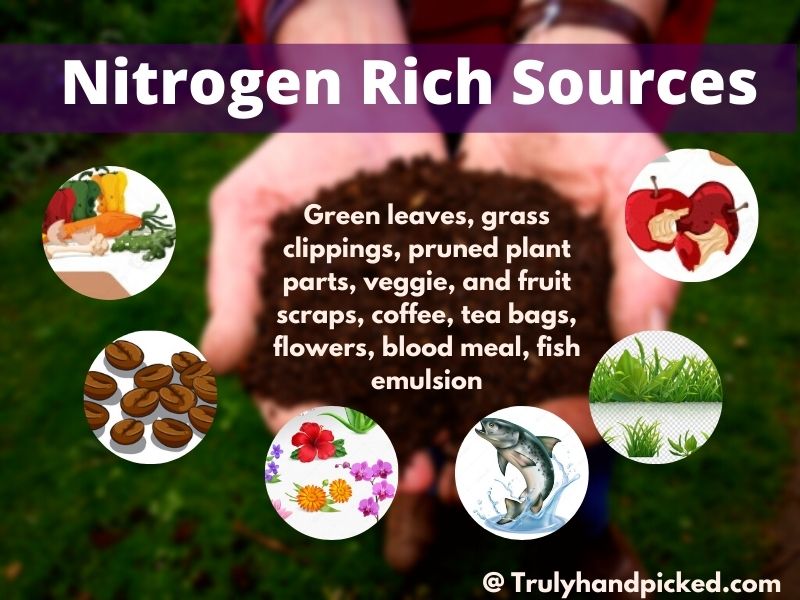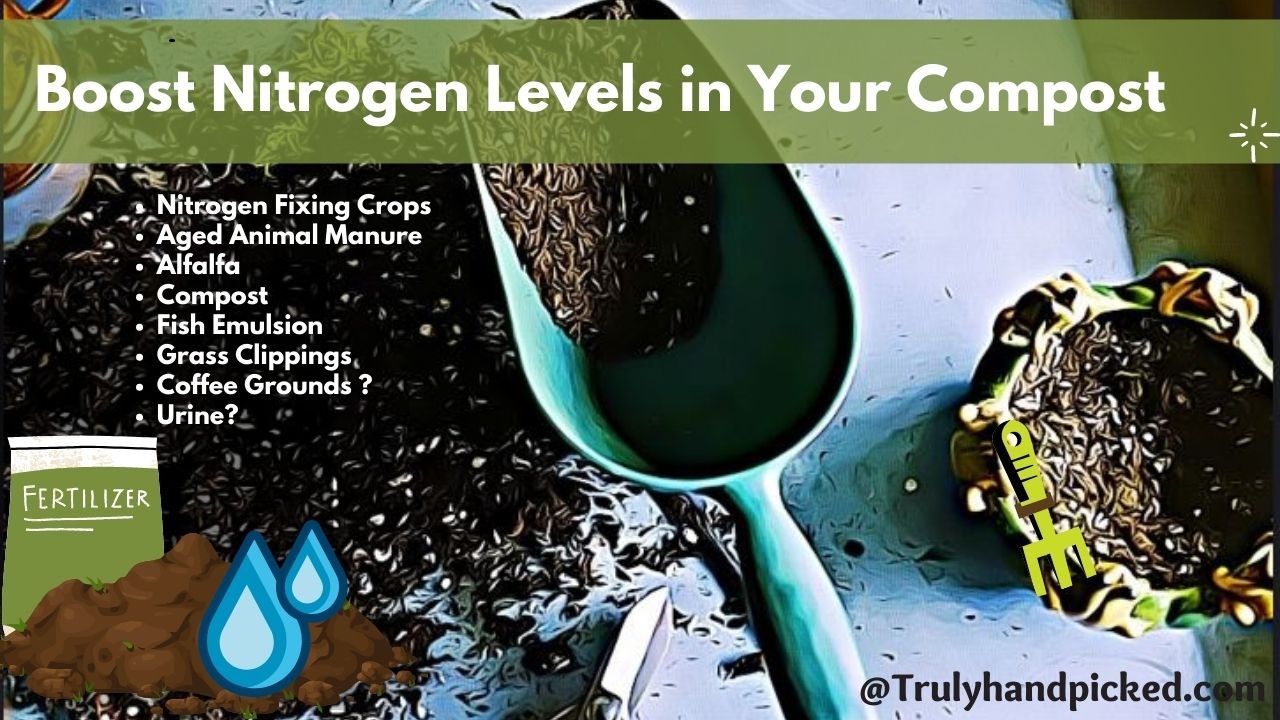Nitrogen is the essential and major nutrient for your plants to thrive and grow healthy. While nitrogen deficiency could drive your plants toward fatal consequences.
How Nitrogen Impacts Soil and Plant Growth
Does adding nitrogen help plants grow?
Nitrogen helps your plants in lush and green growth as it is the key component of chlorophyll. Lack of nitrogen results in improper growth, yellow leaves, unripe crops, and sometimes dried roots within a few days.
Look for an adequate nitrogen level in your fertilizer. Increasing the nitrogen levels through compost would be a brilliant and organic way. Let’s check out some quick and easy ways to add or escalate the required nitrogen level in your garden soil.
Plants that add (fix) nitrogen to soil: Legume varieties such as peas, alfalfa, clover, and similar plants with help of nitrogen-fixing bacteria, store and finally release nitrogen into the soil.

Plants that need more nitrogen: All plants need nitrogen some feed more, while some are light feeders and few are nitrogen fixers. Plants like lettuce, muskmelons, cucumbers, Kale, mustards, spinach, tomatoes, peppers, squash, greens, and sweet corn love more nitrogen in their soil mix.
Related: Best homemade organic plant foods for your garden
What happens if your soil and compost don’t have enough nitrogen?
- Excessive watering or heavy rainfall can wash away nitrogen from your pot or ground
- Fruits and flower yields will be less in quantity and size
- Root developments increase while above-the-ground plant shows stunted growth
- Instead of normal aging, leaves turn old much faster
- Leaves start to look yellowish in tint
Seed meals, blood meals, animal parts, and manure add more nitrogen to your soil and compost.
Signs of too much nitrogen in the soil
- Be it less or too much, both extremes will harm your plants
- Reduced fruits and yields in plants
- Leaves look abnormally green
- Also, too much fertilizer increases salt build-up and again it hinders nutrient absorption by the plant
- Excessive leaves and lesser fruit and flower yield
- Instead of taking steps to reduce the nitrogen levels, initially avoid adding fertilizer in the name of caring for plants
Related: How to use ash and coffee grounds as a natural fertilizer in your garden
How to Naturally Add Nitrogen to Your Compost/Soil:
- Fresh green grass clippings could lift up the nitrogen level in your compost organically. Simply, add a single layer of fresh grass clippings over your compost and let them merge into the matter gradually.
- Try to check the grass clipping before adding. Make sure the dry grass ratio is not higher than the green clippings you are placing on your compost. As dry grass clippings provide more carbon to your matter instead of nitrogen.
- Add Green leaves, weeds, or freshly plucked flowers to your compost to boost the nitrogen levels naturally. Make sure you are adding fresh and disease-free leaves and plants in such cases to get a satisfactory result.
- Add harvested nitrogen-fixing plants into your compost to naturally make your compost rich. Peas, beans, borage, etc. plants store huge amounts of nitrogen. So use leftover plants in compost or plant them in the soil to escalate the nitrogen level in your composting manure organically.
- As we gardeners prepare composted manure in our garden, we can use that old manure. Add the processed manure to the whole pile to get a lift in nitrogen levels naturally.
- Spread blood meal on your compost to boost the nitrogen and phosphorous levels in your compost heavily. Just make sure you are using in moderate proportion for every 100 pounds of compost.
- Spread a non-corn gluten meal to boost the nitrogen level in your compost naturally.
- Adding coffee grounds to your compost would be another clever trick to increase the nitrogen level organically. All you need is just add a single layer of the coffee ground over the top. Let it be there for a couple of days until it combines into your compost entirely.
- Use household waste to increase nitrogen levels in your compost than store-bought expansive manure. Plant cuttings and fruits-vegetable scraps are some of the best instances of it.
- Add Chicken droppings to your compost to increase the NPK levels naturally. Once it gets decomposed, ammonia levels come down, and finally, that doesn’t burn your plants.

Good Sources of Nitrogen From Organic and Kitchen Wastes
Signs of nitrogen deficiency in plants: When plants have stunted growth, leaves turn old faster, and leaves turn yellow. The lush green leaves and productivity of the plant go down.
Fish emulsion for nitrogen: Fish emulsions made from full or parts of fish are good for foliar spray for fast absorption of nutrients.
It contains 4-1-1 burn-free nitrogen and easily gets absorbed by plants. Apart from nitrogen phosphorous and potassium, it contains other micronutrients for the healthy growth of your plants.
Good sources of nitrogen for your compost: Green leaves, grass clippings, pruned plant parts, veggie, and fruit scraps, coffee, tea bags, flowers, and blood meal –high npk sources.
Delaying or slow compost: If compost is taking too long it means your compost is nitrogen deficient. Add adequate nitrogen sources to your compost to speed up the process. Less or more nitrogen will deter the decomposition process.
Related: Fertilizer needs of African violets
Coffee grounds for nitrogen: Though it seems to be brown and feels like it’s carbon, actually it’s green and it adds more nitrogen.
Also adding coffee grounds to your compost increases the potassium, phosphorous levels, and a few micronutrients along with nitrogen.
What is the Carbon-nitrogen ratio for compost? Use the 30:1 part, but the ideal ratio can’t be calculated or measured. It’s by practice we know how much browns (high carbon) or greens and grass clippings(high in nitrogen) to be added.
Mushroom compost for nitrogen: Mushroom compost contains nitrogen in 1:1:1 NPK value. After composting these nutrients are available in a slow-release form that is good for the steady growth of your plants.
Alfalfa meal for nitrogen: Alfalfa pellets or meals can be directly added to soil or compost (even better). It turns out to be nutrient-rich and acts as a slow-release fertilizer.
Related: How to use banana peel as fertilizer
High Levels of Nitrogen
Too much nitrogen in compost: Add many nitrogen sources to your compost pile results in excessive heat which deter decomposition. Often turn your compost and let the compost cool before adding it to plants.
Decrease the nitrogen levels in soil: Add dry mulch to your soil. The excess nitrogen gets used up decomposition process bringing balance to your soil.
Excess nitrogen for plants: Too much of anything is not good, yes and the same is for nitrogen. Plants will have reduced flower and fruit production while there will be excessive foliar growth.
Signs of too much nitrogen in soil: Extreme dark green leaves, burnt leaf edges, and turning yellow because of nitrogen toxicity and lower levels of other nutrients.
Natural High Nitrogen Sources: Feathers and blood meals contain 12 to 15% nitrogen. You can also use chicken droppings that contain much higher levels than cows and other farm animals. Though diluted urine is suggested by a few gardeners we don’t suggest it for hygiene reasons and sample rate success by gardeners.